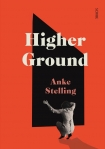Higher Ground, Anke Stelling [historical books to read .TXT] 📗

- Author: Anke Stelling
Book online «Higher Ground, Anke Stelling [historical books to read .TXT] 📗». Author Anke Stelling
‘What’s the matter?’ I asked Ulf, and he said: ‘You could have been a part of it. It’s embarrassing how you make yourself out to be the victim.’
That was how it started, Bea, I should have known. First saying nothing and then opening your mouth doesn’t work: it has to be either or, you or me, commission or no commission — it shouldn’t be about me when it’s about them. Getting to grips with your own feelings is a risky business.
September 2013; Carolina’s fortieth birthday.
‘What have I done?’
Ulf opened another bottle of champagne. I offered up my glass, trying to get him to give me a refill, come what may, wanting the others to see that at least Ulf was still talking to me, wasn’t giving me the cold shoulder or going to throw me out. The wall of silence from the women might have just been a catfight, a game among fourth-grade girls; they were probably annoyed that my photo had appeared in a magazine and not theirs—
‘Is it about the article?’
Ulf said nothing.
‘It was a commission!’
Ulf narrowed his eyes at me.
‘I was writing about myself!’
‘And about us.’
This us was a we that didn’t include me.
Ulf turned away and refilled other people’s glasses. Had neither the time nor the inclination to argue with me. It was Carolina’s fortieth, and he was not going to let anybody spoil her party, any more than his house, his project, his private or his professional decisions.
The only person who spoke to me at the party was Ulf’s father.
‘I thought it was funny,’ he says.
‘Oh, really?’
I was already on my way out, and he was already drunk.
‘I liked the thing about the transparent walls that still serve to segregate people. Very well observed, Resi. Hats off.’
‘Ulf taught me that. How to reflect on architecture. How to see it as a metaphor as well as something concrete.’
‘Now he’s offended.’ Ulf’s father grinned.
I didn’t grin back, and he noticed. Looked at me pityingly and almost lovingly.
‘He’ll get over it,’ he said. ‘Just you wait.’
And I waited. Avoided the topic and pretended there was nothing wrong. Carried on meeting my friends for coffee — but preferably out in a café rather than in their spacious kitchen-cum-living-rooms, or on their balconies decked with plants, or in the communal garden. Lest we were reminded of that unpleasant subject.
But at the same time, I was always thinking about it. Why was it so terrible to write that the house had created a divide?
‘You wrote about yourself,’ said Sven.
‘Yes, of course! That was what I was asked to do!’
‘Perhaps. But you gave yourself that liberty. Why, actually?’
Sven understands more than I do, Bea, you should know that.
Sven realised long ago that this equality thing was a lie. Because as a kid, Sven had not only made it into a Gymnasium but even higher, studying the Classics at university, where the people he met had no intention of stooping to his level. They made sure instead that the guinea pig knew where it really belonged: in its pen.
As a kid, I had mixed with people who all agreed that pens, fences, and lines of any kind should be abolished and overcome in the name of freedom. Leftist people, idealists who, even if they were privileged, dreamed of a world that was more just, at least for us children. And that’s why they did everything in their power to make us forget the existence of privilege; or, at least, to see it as a nuisance, like an untidy garage with a broken automatic door.
In those circles, people said that money didn’t buy happiness, property was a burden, and the rich didn’t enter the kingdom of heaven, like Scrooge in A Christmas Carol. Evil people like Scrooge were responsible for the misery in what was called the Third World back then. People like that even made pacts with Hitler during the Third Reich, just to keep their revolting privileges. But the rich people we knew were different and were just trying to stop suffering and inequality. And that’s why poor, innocent, non-homeowners like us — who were therefore morally superior — weren’t allowed to harp on about being poor, honest, and morally superior. No, everybody had to turn over a new leaf together. And because at that time, educational establishments had started offering everybody the same access and opportunities, and we had a level playing field — except that term wasn’t used at the time, and why should it have been, seeing as we all played fair — it was only natural that things would turn out better for everybody from then on.
It’s nice to move in these circles.
Until you realise that something’s not right.
That it’s necessary to share or even give up privileges instead of merely being ashamed of them or badmouthing them a bit.
That by the time these people become older and wiser than the rest, have children or just with the passing of time, they have become more interested in 'making it' than being able to face their old, idealistic selves in the mirror — the mirror they left behind in their old flat, because it didn’t suit the furnishings of their new flat, where even the mirrors are flawlessly fitted.
As it happens, the first thing that came to mind when I was writing my article was Ulf’s embarrassment when he tried to skip the walk-in wardrobe while showing me around his apartment.
‘But why?’ I said, opening the door myself. ‘These wardrobes are fantastic. I’d love one myself.’ Pointing out in my article that I was envious didn’t make up for mentioning





Comments (0)